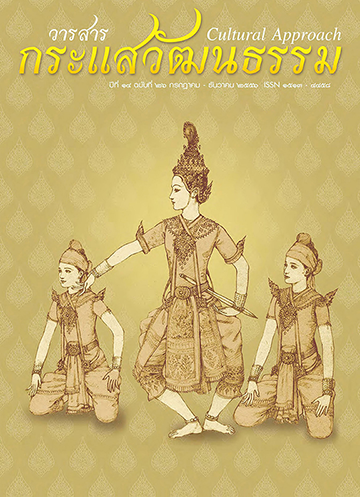บทบาทของละครย้อนยุคที่มีต่อการสืบสานและอนุรักษ์มรดกวัฒนธรรมไทย
Main Article Content
Abstract
บทคัดย่อการศึกษาเรื่อง “บทบาทของละครย้อนยุค ที่มีต่อการสืบสาน และอนุรักษ์มรดกวัฒนธรรมไทย” นี้มุ่งเน้นเพื่อศึกษาวิเคราะห์เนื้อหาบทละครย้อนยุค ที่สื่อแสดงให้เห็นมรดกวัฒนธรรมไทย และภาพเหตุการณ์ประวัติศาสตร์ไทยในแต่ละยุคสมัย รวมทั้งศึกษาบทบาท และความสำคัญของละครย้อนยุคในด้านการถ่ายทอดองค์ความรู้วัฒนธรรมไทย และประวัติศาสตร์ไทยสู่ผู้ชม อีกทั้งชี้ให้เห็นถึงคุณค่า และความสำคัญของละครย้อนยุคในด้านวัฒนธรรมไทยที่มีต่อสังคม ท่ามกลางกระแสความนิยมวัฒนธรรมและสื่อบันเทิงต่างชาติ ตลอดจนเสนอแนะแนวทางที่เหมาะสม ในการผลักดันให้ละครย้อนยุค ได้รับความสนใจจากผู้ชม ผู้ศึกษาได้ใช้วิธีการวิจัยเชิงคุณภาพโดยการวิเคราะห์เนื้อหาบทละครย้อนยุค จำนวน 4 เรื่อง คือ สายโลหิต รัตนโกสินทร์ สี่แผ่นดิน และวนิดาซึ่งละครแต่ละเรื่องเป็นตัวแทนของการสื่อแสดงให้เห็นมรดกวัฒนธรรมไทย และภาพเหตุการณ์ประวัติศาสตร์ไทยในสมัยอยุธยาตอนปลาย ถึง สมัยรัตนโกสินทร์ คือช่วงปี พ.ศ. 2300 ถึง พ.ศ. 2500ผลการศึกษาพบว่า ละครย้อนยุค เป็นละครที่อยู่คู่สังคมไทยมายาวนาน ได้สะท้อนให้เห็นถึงรากเหง้าความเป็นไทย ซึ่งผู้แต่งได้จำลองบรรยากาศของยุคสมัยต่าง ๆ ที่ผ่านพ้นไปแล้วในอดีต ให้คนในสมัยปัจจุบันได้รับรู้ ด้วยการถ่ายทอดสำนวนภาษา และบทสนทนาที่มีความแตกต่างจากยุคสมัยปัจจุบัน รวมถึงการถ่ายทอดความรู้ด้านวัฒนธรรม และประวัติศาสตร์ไทย ออกมาให้เห็นในรูปแบบฉาก และการแต่งกาย ได้ชัดเจนที่สุดนอกจากนี้ยังพบว่า ละครย้อนยุคมีข้อจำกัดในการผลิตหลายประการ เช่น ต้องใช้งบประมาณในการผลิตสูงต้องใช้เวลาศึกษาข้อมูลเป็นเวลานาน ดังนั้น จึงควรมีกองทุน หรือองค์กรที่สนับสนุนละครย้อนยุคโดยตรง เพื่อกระตุ้นให้ทุกภาคส่วนได้มีส่วนร่วมในการส่งเสริมสนับสนุนความเป็นไทย ยิ่งไปกว่านั้น บทบรรยายใต้ภาพ (Subtitle)และบทละครควรมีหลายภาษา เพื่อผลักดันให้ละครย้อนยุคได้รับความสนใจทั้งในประเทศ และต่างประเทศอย่างจริงจัง และ เพื่อให้ผู้ชมชาวต่างชาติเข้าใจในเอกลักษณ์ความเป็นไทยมากขึ้นคำสำคัญ : ละครย้อนยุค มรดกวัฒนธรรม การอนุรักษ์ ความเป็นไทย ละครพีเรียด
Article Details
How to Cite
โกพล ก. (2014). บทบาทของละครย้อนยุคที่มีต่อการสืบสานและอนุรักษ์มรดกวัฒนธรรมไทย. Journal of Cultural Approach, 14(26), 57–69. retrieved from https://so02.tci-thaijo.org/index.php/cultural_approach/article/view/15661
Section
Research Article
Proposed Creative Commons Copyright Notices
1. Proposed Policy for Journals That Offer Open Access
Authors who publish with this journal agree to the following terms:
- Authors retain copyright and grant the journal right of first publication with the work simultaneously licensed under a Creative Commons Attribution License that allows others to share the work with an acknowledgement of the work's authorship and initial publication in this journal.
- Authors are able to enter into separate, additional contractual arrangements for the non-exclusive distribution of the journal's published version of the work (e.g., post it to an institutional repository or publish it in a book), with an acknowledgement of its initial publication in this journal.
- Authors are permitted and encouraged to post their work online (e.g., in institutional repositories or on their website) prior to and during the submission process, as it can lead to productive exchanges, as well as earlier and greater citation of published work (See The Effect of Open Access).
Proposed Policy for Journals That Offer Delayed Open Access
Authors who publish with this journal agree to the following terms:
- Authors retain copyright and grant the journal right of first publication, with the work [SPECIFY PERIOD OF TIME] after publication simultaneously licensed under a Creative Commons Attribution License that allows others to share the work with an acknowledgement of the work's authorship and initial publication in this journal.
- Authors are able to enter into separate, additional contractual arrangements for the non-exclusive distribution of the journal's published version of the work (e.g., post it to an institutional repository or publish it in a book), with an acknowledgement of its initial publication in this journal.
- Authors are permitted and encouraged to post their work online (e.g., in institutional repositories or on their website) prior to and during the submission process, as it can lead to productive exchanges, as well as earlier and greater citation of published work (See The Effect of Open Access).


